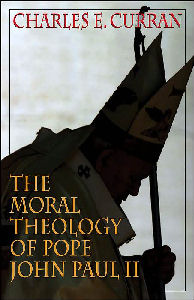
|
Posted May 11, 2005
Book: The Moral Theology of Pope John Paul II Author: Charles E. Curran Georgetown University Press, Washington, DC, pp. 262 An Excerpt from the Jacket:
. . . Curran focuses on the authoritative statements, specifically the fourteen papal encyclicals the pope has written over the past twenty-five years, to examine how well the pope has addressed the broad issues and problems in the church today. Curran begins with a discussion of the theological presuppositions of John Paul II’s moral teaching and moral theology. Subsequent chapters address his theological methodology, his ethical methodology, and his fundamental moral theology together with his understanding of human life. Finally, Curran deals with the specific issues of globalization, marriage, conscience, human acts, and the many issues involved in social and sexual ethics. An Excerpt from the Book: Globalization and Global Ethic Perhaps the best way to conclude this discussion of the social teachings of John Paul II is to use the lens of the contemporary discussion about globalization and the global ethic. Today we are conscious of the reality of globalization and the global interdependence of all of us who live together on planet Earth. Even a generation ago, we never realized how climate and weather were global. Recently in the United States, we have come to understand how much of the weather is affected by El Nino. Environmental concerns today are global. Global warming and the destruction of rain forests have effects all over the world. Today we are well aware of the role of multinational corporations in our world. The economic power of such corporations has a huge impact on human existence in all parts of the world. Truly today we are living in a global village. William Schweiker accepts the understanding of globalization as the rapidly developing and ever-desensing network of interconnections and interdependence that characterizes modern social life. The global vison is marked by an increasing social density that affects the way we see reality and how we live in the global village. This compression of the world and our reaction to it generate the problem of proximity, which confronts us with the issue of how to live so near others, most of whom are very different from us and some of whom are even enemies. Our global awareness and our proximity to all others can result in either greater cooperation or greater conflict. This precarious situation, which could move toward cooperation or conflict, global order or global chaos, is exaggerated by the tremendous growth of human power — especially technological power, which is so difficult to control. Today one thinks especially of huge economic power but also of the need to control it for the good of all. In light of globalization, there is a crying need for a global ethic. We are faced with the alternatives of cooperation or conflict. The danger is that power will ultimately triumph and the powerless will become even more oppressed. One of the earlier responses to the challenge came from the World Parliament of Religions in 1993, with its “Declaration toward a Global Ethic.” Hans Kung was the primary mover behind the declaration and has continued to write and work for the cause of the global ethic. But can there be a global ethic? Problems abound. From a philosophical perspective, some claim that there cannot be a global or common ethic precisely because of the great diversity of human cultures, languages and traditions. No one comes to the conversation with a truly universal and unprejudiced perspective. We cannot arrive at an ethic that all people can and will accpet. At the very minimum, even if agreement can be found, it will only be on the level of greater generality; but, as we all know, the devil is in the details. Even if we can agree on recognizing basic human rights, all also recognize the conflicts between and among these rights in the complexity of everyday life. A Christian realist perspective acknowledges the continuing and powerful presence of sin and its effects. Powerful groups and nations will always be tempted to protect and augment their own power and to not care about the concerns and needs of others. From a political perspective, as long as national sovereignty continues to be the controlling force in the world, there will be no way to enforce a global ethic. Independent and powerful nations will continue to insist on what is in their best interests. . . . John Paul II’s social teaching shows that he is a strong advocate of a global ethic, even though he does not use the term. His perspective on social ethics has been consistently global in scope. His role in the Catholic Church gives him a global perspective beyond the boundaries of race, culture, language, and nation. He serves a universal church. In addition, he addresses his social encyclicals to all people of goodwill. His teaching shows a special concern for persons in need and in the developing world. Thus, his vision and perspective have been consistently global. The content of his ethics is also global. His anthropology insists on the dignity of all individuals and upholds the equality of all, despite the many diversities among human persons. Human dignity comes from the fact that God has made each human person in God’s own image and likeness. But the human person exists in solidarity with other human beings and is not just an isolated monad. Solidarity affects the person in many different relationships but also includes the broadest relationship of solidarity with all other people on the globe . . . . Table of Contents: 1. Theological Presuppositions 2. Theological Methodology 3. Ethical Foundations and Method 4. Conscience, Human Acts, and Human Life 5. Marriage, Sexuality, Gender and Family 6. Social Teaching |
|
